“I Am the Light of the World”
John 7–8
LDS manual: here
Purpose
To discuss how to find out what’s true.
Reading
We’re now in Jesus’ later Judean ministry. He’s gotten people to believe in his miracles. His followers think he’s the Messiah. And now in this reading, in one of the most protracted arguments between Jesus and the Pharisees, he proclaims that he’s actually Jehovah.
If Jesus was a real person who said these things, he seems to have suffered from Joseph Smith Syndrome: having started on this hero-saviour trip, it’s very difficult to stop.
This theological argument takes up most of our reading, and while in some ways there’s some interesting rhetorical jiu-jitsu going on, in the end it’s all just so much pointless sectarian wrangling. From an atheist’s perspective, I just see people tossing around religious insults. Jesus and the Pharisees call each other devils.
John 8:48 Then answered the Jews, and said unto him, Say we not well that thou art a Samaritan, and hast a devil?
8:49 Jesus answered, I have not a devil; but I honour my Father, and ye do dishonour me.
Jesus threatens them like a pissed-off street preacher.
John 8:23 And he said unto them, Ye are from beneath; I am from above: ye are of this world; I am not of this world.
8:24 I said therefore unto you, that ye shall die in your sins: for if ye believe not that I am he, ye shall die in your sins.
Now that I’m out of religion, and understanding that nothing based on supernaturalism can be right, I think I can see this chapter for what it is. I’m so glad that I can check out, and I don’t have to concern myself with it. What a relief.
This is an old, old fight, of course. Unfortunately, it’s been playing out over and over again among the world’s religious believers for millennia. The only difference is that, in this discussion, no one got killed.
Main ideas for this lesson
Heading
John really didn’t like Jews.
John 7:1 After these things Jesus walked in Galilee: for he would not walk in Jewry, because the Jews sought to kill him.
Oh, John. You can tell that you wrote this last — somewhere between 70–120 CE. That’s when the conflicts between the Christian Jews and the Jewish Christians came bubbling up. It couldn’t have been written earlier.
How do we know what’s true?
Jesus gives a strange way of telling whether something’s true.
John 7:17 If any man will do his will, he shall know of the doctrine, whether it be of God, or whether I speak of myself.
Jesus seems to be saying that experimentation is the way to find out if he’s the real deal. While a good controlled experiment is an important part of the complete scientific method, that’s not what Jesus is describing here. There’s a phrase for it: “Suck it and see.” That’s not the best way of evaluating claims.
But what’s wrong with trying something out? Well, evidence from our own personal experiences may seem convincing to us. But these kinds of anecdotes are actually the least credible form of evidence because of the way our brains put together our own personal story. If I believe that I have a lucky rock that keeps me from harm, then that belief gets in the way of examining the idea as impartially as I could. I might engage in confirmation bias, ignoring the times when the rock doesn’t work. Other forms of evidence would be better.
It’s telling, then, that missionaries use the least effective kinds of evidence on investigators. Missionaries invite investigators to take on an ever-increasing set of commitments, in the hopes that the investment fallacy will take hold. When you’ve started doing something, it’s hard to stop. Stopping would imply that what you did was pointless, and who likes to admit that?
I’m enjoying this post about the investment fallacy from You Are Not So Smart.
Imagine you go see a movie which costs $10 for a ticket. When you open your wallet or purse you realize you’ve lost a $10 bill. Would you still buy a ticket? You probably would. Only 12 percent of subjects said they wouldn’t. Now, imagine you go to see the movie and pay $10 for a ticket, but right before you hand it over to get inside you realize you’ve lost it. Would you go back and buy another ticket? Maybe, but it would hurt a lot more. In the experiment, 54 percent of people said they would not. The situation is the exact same. You lose $10 and then must pay $10 to see the movie, but the second scenario feels different. It seems as if the money was assigned to a specific purpose and then lost, and loss sucks.
Believers seem okay with this experimentation method that Jesus is advocating, but are they okay with it in other areas? Would they agree that the same is true for Buddhism, Hinduism, or Islam? The same people who encourage religious experimentation (for their religion only) also discourage experimenting with recreational chemicals and alternative sexual practices. Clearly, they don’t believe that the method is so great; only insofar as it ensnares people into their system.
Ask: If “suck it and see” isn’t a good way to find out what’s true, then what is? How do you know if something’s true?
I use a way that is partial and incomplete, it’s difficult, and it takes a long time. Sometimes the results get overturned later. But it’s the best thing humans have ever made for finding out what’s true. It’s the scientific method.
My favourite formulation of the scientific method is on this terrible Geocities webpage. It uses the mnemonic O HECK.
“O.H.E.C.K.” is a memory aid developed by your instructor to help you remember the order of events in what is sometimes called the scientific method. It is an acronym, with each letter standing for a word.
Observation: someone (maybe you!) notices some event in the natural world (Phenomena) that makes them wonder about the event’s cause.
Hypothesis: this is a possible explanation developed by somebody (maybe you!) as to the cause of some mysterious phenomena that has been Observed.
Experiment: the Hypothesis is tested in some way. If a hypothesis can’t be tested, it really isn’t scientific.
Conclusion: at the end of the Experiment, either the Hypothesis has been proven false or it hasn’t been proven false. It is never “proven” true!
Knowledge-Sharing: the Conclusion of the Experiment must be shared with other researchers, who will either develop a better test for the Hypothesis or (often) develop a better Hypothesis !
I think this last step is the most important. Knowledge must be peer-reviewed. One person can get it wrong, but it’s less likely (in the very long term!) that everyone will get it wrong. As we share knowledge, the good stuff floats to the top. This is why we need a variety of inputs in our knowledge. If someone tells you that certain sources of information are off-limits, or that some points of view are forbidden — not just worthless (like some are), but are wrong even to consider — that’s a warning sign.
Truth makes you free.
One verse in this reading has some merit:
John 8:32 And ye shall know the truth, and the truth shall make you free.
Testimonials are worthless, as in the chart above. With that established, I would just like to share my own experience. As I’ve learned more about how to find out what’s true, and as my ability to think critically has improved, I’ve been better able to spot poor reasoning and be fooled less often. It’s an on-going process. I try to stay plugged into skeptical topics, keep up with what scientific-minded people are thinking and writing about, and stay open to changing my mind when necessary.
Having a better idea of what’s true means that I have better information that I can use to base decisions on. This has helped me to be freer than I could have been in the church.
Woman in adultery story was added later
I always liked the story of the woman taken in adultery.
John 8:1 Jesus went unto the mount of Olives.
8:2 And early in the morning he came again into the temple, and all the people came unto him; and he sat down, and taught them.
8:3 And the scribes and Pharisees brought unto him a woman taken in adultery; and when they had set her in the midst,
8:4 They say unto him, Master, this woman was taken in adultery, in the very act.
8:5 Now Moses in the law commanded us, that such should be stoned: but what sayest thou?
8:6 This they said, tempting him, that they might have to accuse him. But Jesus stooped down, and with his finger wrote on the ground, as though he heard them not.
8:7 So when they continued asking him, he lifted up himself, and said unto them, He that is without sin among you, let him first cast a stone at her.
8:8 And again he stooped down, and wrote on the ground.
8:9 And they which heard it, being convicted by their own conscience, went out one by one, beginning at the eldest, even unto the last: and Jesus was left alone, and the woman standing in the midst.
8:10 When Jesus had lifted up himself, and saw none but the woman, he said unto her, Woman, where are those thine accusers? hath no man condemned thee?
8:11 She said, No man, Lord. And Jesus said unto her, Neither do I condemn thee: go, and sin no more.
Jesus is so casual, writing on the ground like that.
So I’m totes devs to learn that it’s probably a fabrication.
Unfortunately, John didn’t write it. Scribes made it up sometime in the Middle Ages. It does not appear in any of the three other Gospels or in any of the early Greek versions of John. Even if the Gospel of John is an infallible telling of the history of Jesus’s ministry, the event simply never happened.
Most Bible scholars agree.
“The most ancient authorities lack 7.53—8.11; other authorities add the passage here or after 7.36 or after 21.25 or after Luke 21.38, with variations of text; some mark the passage as doubtful. Scholars generally agree that this story was not originally part of the Gospel of John.”
Here’s another page of references.
And Nonstampcollector sees a problem that Christians don’t: Jesus is only enlightened insofar as he ignores the law he gave when he was Jehovah the murderous psychopath.
Additional lesson ideas
What didn’t they include in this reading?
One thing they decided not to treat was this story, in which Jesus tells someone not to bury his dead father.
Matthew 8:21 And another of his disciples said unto him, Lord, suffer me first to go and bury my father.
8:22 But Jesus said unto him, Follow me; and let the dead bury their dead.Luke 9:59 And he said unto another, Follow me. But he said, Lord, suffer me first to go and bury my father.
9:60 Jesus said unto him, Let the dead bury their dead: but go thou and preach the kingdom of God.
Seems a bit heartless, but again, this is right in line with Jesus’ idea that he had to come before everything else, including family obligations. Typical for a cult leader.
Next week: more doubtful miracles. See you then.
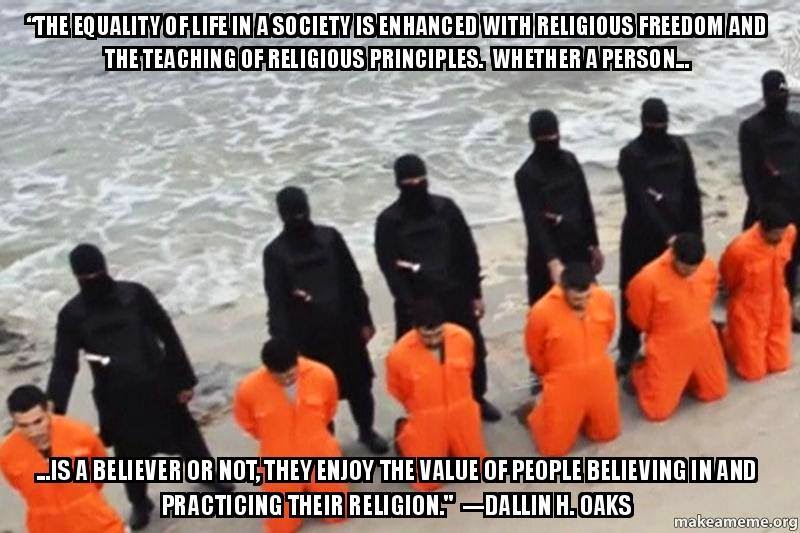
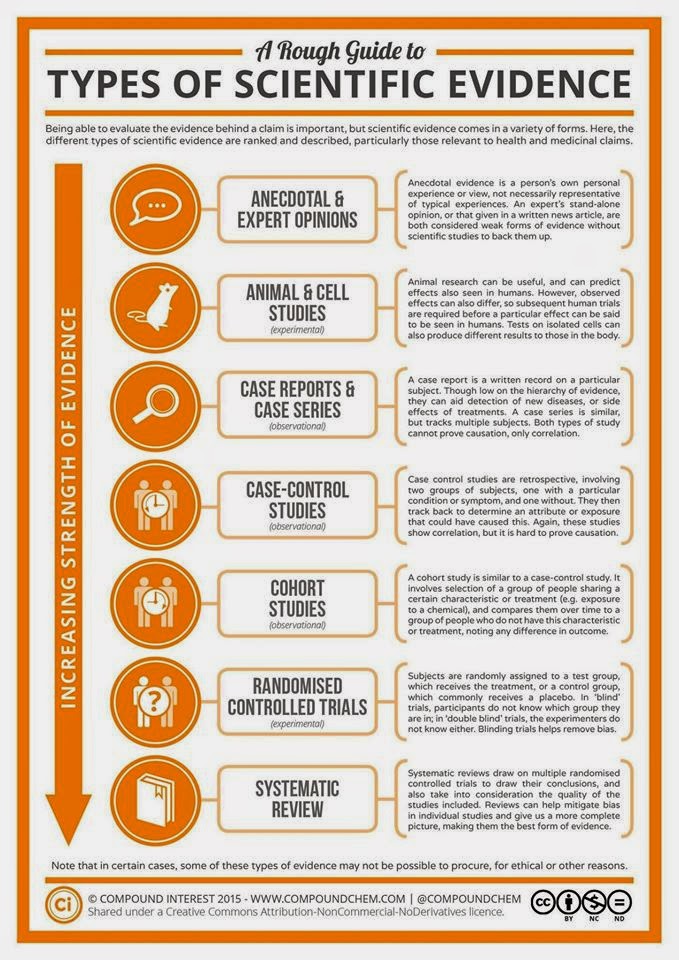
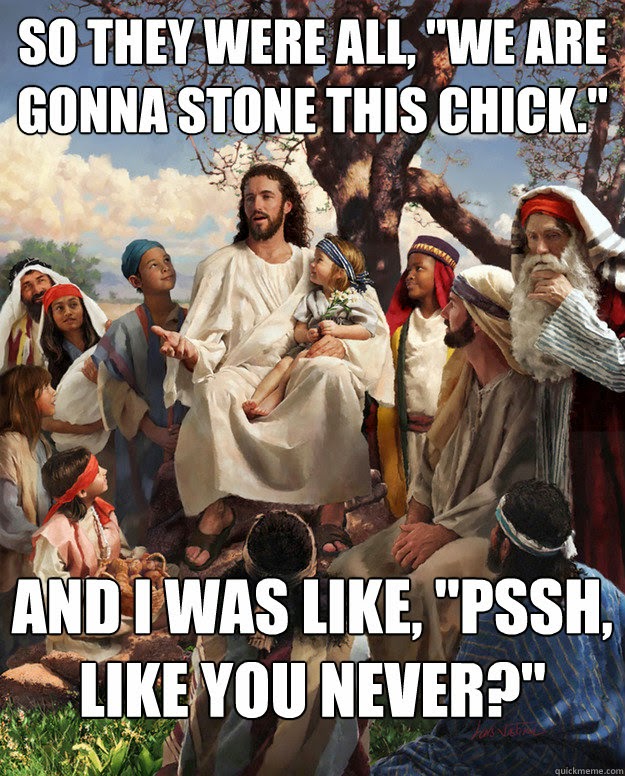
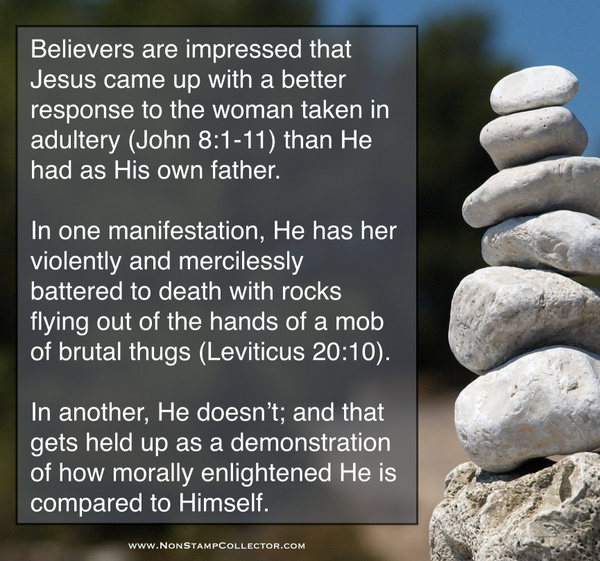
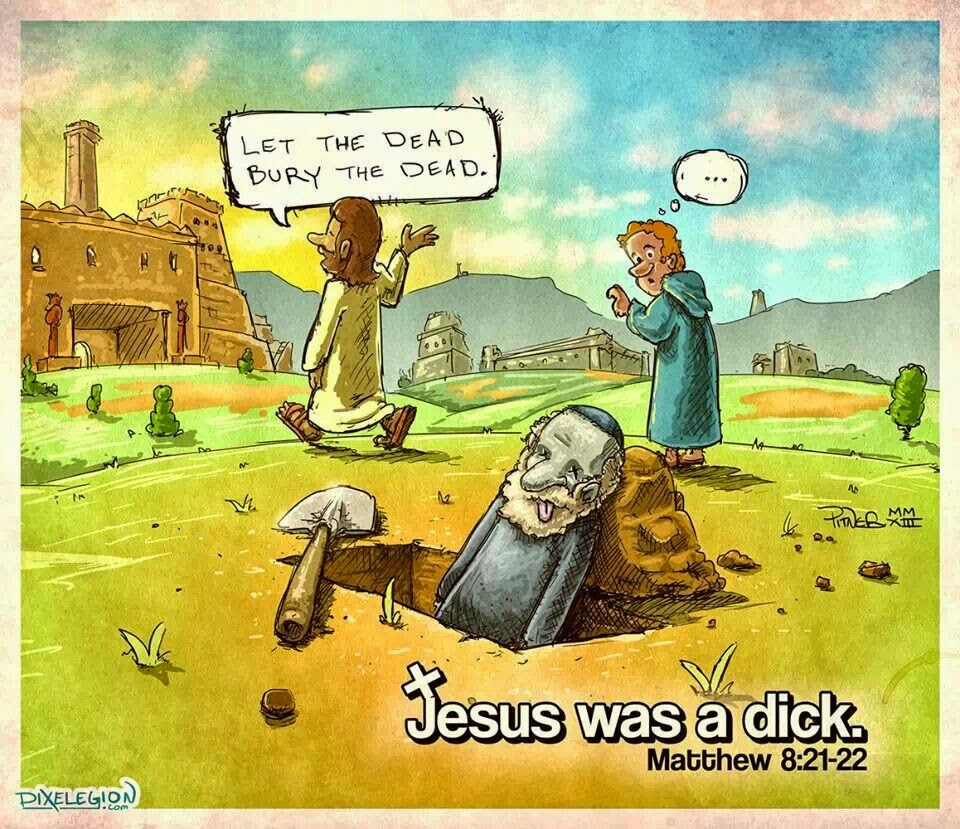
Recent Comments